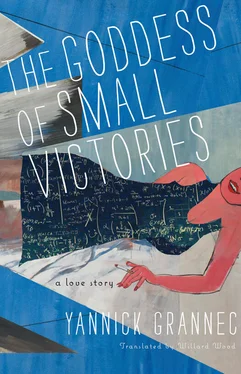Anna placed a soothing hand on Adele’s, to which the old woman responded by clasping her hand hotly.
“I have some advice for you, young lady. Avoid mathematicians like the plague! They squeeze you dry like a lemon, abduct you from everything you love, and don’t even give you a brat in return!”
26. SUMMER 1942: Blue Hill Inn
When a man of genius speaks of “the difficult” he means, simply, “the impossible.”
— Edgar Allan Poe, Marginalia
However limited in truth human nature may be, still very much of the infinite adheres to it.
— Georg Cantor, “Foundations of a General Theory of Manifolds”
A gull’s cry nudged me from my troubled dreams. Pillows and comforter lay on the floor. The drawn curtains let a shaft of light into the silent room. Kurt was sitting in his shirtsleeves at the little writing desk. I walked up behind him to knead his shoulders.
“Can I open the curtains?”
“Leave them drawn, if you would. I have a headache.”
Groping my way, I restored a little order to the room. His raincoat, hanging on the back of a chair with his usual precision, was damp.
“Did you go out during the night?”
“I went for a walk.”
“Didn’t it help you get some sleep?”
“I have something on my mind.”
I gave myself a whore’s bath and got dressed without a word. He was sunk in contemplation of an engraving over the desk: a delicate dance of jellyfish.
“I’m going downstairs. If it’s all right with you.”
“Adele. I’m having problems.”
In fourteen years of living together, I had never heard him say anything like that. I wrapped my arms around him to inhale his trouble.
“What can I do, Kurtele?”
“Go and have breakfast.”

On the recommendation of his friend Oswald Veblen, we had taken a room in a charming, white clapboard inn surrounded by a sea of pines. We had already visited Maine the year before, staying with a colleague. Kurt had enjoyed the fresh, pure air from the sea. The flowering lilacs had reminded him of those in Marienbad. This time, Kurt had hardly left our hotel bedroom since we’d arrived in Blue Hill. At night, he would sometimes disappear on long, solitary walks along the coast.
In the hotel dining room, the vacationers made a pretense of not inspecting me. I ventured a timid “Good morning.” At that time, I was still having trouble making myself understood. I chose an isolated table near the window. The proprietress was talking in undertones with an elderly couple. About us, no doubt. The trio kept shooting me furtive glances. Mrs. Frederick wiped her hands briskly on her apron.
“Mrs. Gödel! How are you this morning? We don’t often see you at breakfast. But tell me about your husband, doesn’t he ever eat?”
“Speak more slowly please.”
She gave a meaningful nod to the other guests.
“Your husband?”
“He sleeps.”
“At night, I hear, he goes out.”
“He does work.”
“What kind of work?”
“Mathematics.”
“Can I clean the room?”
She spoke each syllable separately and distinctly. I wanted to stuff her apron into her slack mouth.
“I do it.”
“Housekeeping is included in the price of the room.”
She shrugged and moved away. Our eccentricities were only confirming her initial impression. When she checked our passports on arrival she had been alarmed.
“Are you Germans?”
“We are refugees from Austria.”
She looked at us suspiciously. Ever since the United States’ entry into the war, our visas no longer counted, we were potential Nazis. Kurt didn’t trust her either. At our first breakfast, she had watched, mortified, as he wiped and repositioned the silverware. In retaliation, she had poured his coffee on the table next to his cup. Later that morning, she had snooped around our bedroom. Ever since, he had refused to let her clean the room and stopped coming down to meals. The gossip flew behind our backs. We were foreigners. Enemies. We should have acted out a more convincing parody of normality.
How I missed Vienna! It was almost time for the grape harvest in Grinzing. People would be drinking Heuriger, the new wine. So different from that horrible drink the Americans adored, which tasted of cough medicine. I didn’t know whether the war had shut down the cabarets. I had no news from my family. The University of Vienna had addressed a formal request to Princeton University through the German consulate: Kurt Gödel was not to prolong his stay in the United States. He stalled for time by applying for a salaried position that would be less stressful to his weak heart. Moreover, he was called up for a medical exam by the American army. Frank Aydelotte, the director of the Institute for Advanced Study, had had to write a formal diplomatic letter, saying: “Kurt Gödel is a genius. Unfortunately, he is subject to psychotic fits.” It bought us time, but how would we manage on his meager salary as a visiting scholar? What kind of career could he expect now that he wore the label “psychotic”? We weren’t welcome here. According to rumor, the American government was going to intern all Japanese residents in camps, even if they were American citizens. When would they do the same to those of German origin? 5Even before the war, we had made a detour so as not to pass in front of our consulate or even a German travel agency in New York. We were afraid of being brought in. The entire German-speaking community shook with retrospective fright over its escape and with anxiety over its future in a country at war with its native land. I had to learn English to break my dependence on this anxious-making circle. Somehow I couldn’t manage. Kurt reproached me with not trying at all. I clung to the word “temporary.”
I’d been so frightened during our long trip. I was still frightened. In September 1940, a submarine had sunk a transatlantic liner bringing hundreds of British children to North America. The Nazis were in Paris. They had attacked the USSR. The Japanese were carpet-bombing the Pacific. Every avenue of escape was closed. We were foreigners, imprisoned in an enormous country. Here, everything was huge, even the emptiness.
For Kurt, the future was a blackboard, newly erased. His lectures at Princeton and Yale had been warmly received. He seemed enthusiastic, even if the word had not featured in his vocabulary for a long time. He made a list of my resolutions. I could have made a list of his many lists: one for the things he should read, another for the articles he should finish writing, even one giving a schedule of his walks. He had projects, ideas — a future.

I asked for a breakfast tray to be sent up to our room. Mrs. Frederick grudgingly obliged. Folded in plain view was the headline: “Nazis Reach Canada! German Subs Found in Saint Lawrence!”
When I went back upstairs, Kurt was still at his desk. He gulped down the coffee and pushed the toast away. I wandered around the room looking for something to do. I didn’t feel like knitting and even less like reading in the semidarkness. Kurt grew irritated at my restlessness. He took his glasses off to clean them. His eyes were red from lack of sleep.
“Let’s go look at the ocean. You’re like a caged animal. I can’t concentrate when you’re like this.”
In a moment I was at the door, basket in hand, but Kurt took his time and locked his papers away in our trunk. That damned woman was liable to read them as encrypted messages.
We went downstairs without making any noise. From the radio in the pantry came snatches of the endlessly replayed patriotic song “We Must Be Vigilant.” Whenever we walked by, the landlady turned up the volume.
Читать дальше













